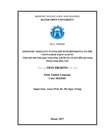Luận văn420 TR-HEpistemic modality in English with reference to the Vietnamese equivelents /
 |
DDC
| 420 | |
Tác giả CN
| Trần, Thị Hồng | |
Nhan đề
| Epistemic modality in English with reference to the Vietnamese equivelents / Trần Thị Hồng; GVHD: Ho Ngoc Trung | |
Thông tin xuất bản
| H. : Viện Đại Học Mở Hà Nội, 2017 | |
Mô tả vật lý
| 62tr. ; A4 | |
Tóm tắt
| It can not be denied that modality, which is normally classified into deotic modality and epistemic modality, plays an important role in English language. While deontic modality expresses the obligation or necessity, epistemic modality adds different degree of certainty to the speakers’ attitude, belief and commitment to the realis. Besides, epistemic modality challenges both speakers and listeners in their communicative strategy such as politeness or hedges. Owning to the intergral part of epistemic modality in English, the study is chosen to investigate epistemic modality in both terms of semantic and syntactic features. However, the semantic meaning and syntactic features of epistemic modality are not accessed in a traditional way; they will be focused in the view of pragmatics for their meaning in context and in the view of theme- rheme structure for their occurrence in the utterances, clauses or sentences. The contrastive analysis of epistemic modality in English with the Vietnamese equivelents will reveal the similarities and differences between the two languages. To some extent, English and Vietnamese share the same matter of epistemic modality regardless of the differences in the markers of the two languages. English in this point of view seems to be more various, expresing larger scale of certainty degree. In terms of syntactic features, epistemic modality is more flexible, i.e. easier to move in utterances, clauses or sentences than in Vietnamese. The similarities and differences of epistemic modality in English and Vietnmese set the ground for the survey which will be carried out at NBK high school to find out the common errors of the learners there. The suggestions for a better understanding and the implications for teaching and learning English epistemic modality, therefore, will be a valuable source to help the learners learn English better | |
Từ khóa tự do
| syntactic- | |
Từ khóa tự do
| semantic features, | |
Từ khóa tự do
| theme- rheme structure | |
Từ khóa tự do
| Epistemic modality, | |
Địa chỉ
| 01Kho Luận văn(2): 01501714, 08100950 |
| |
000
| 00000nam#a2200000ui#4500 |
|---|
| 001 | 71257 |
|---|
| 002 | 7 |
|---|
| 004 | 18E35B14-B07D-4F4B-A13C-FAAE8278DF02 |
|---|
| 005 | 201809131342 |
|---|
| 008 | 081223s2017 vm| vie |
|---|
| 009 | 1 0 |
|---|
| 039 | |a20180913134223|bminhkhue|y20180517103427|zhonghanh |
|---|
| 082 | |a420|bTR-H |
|---|
| 100 | |aTrần, Thị Hồng |
|---|
| 245 | |aEpistemic modality in English with reference to the Vietnamese equivelents / |cTrần Thị Hồng; GVHD: Ho Ngoc Trung |
|---|
| 260 | |aH. : |bViện Đại Học Mở Hà Nội, |c2017 |
|---|
| 300 | |a62tr. ; |cA4 |
|---|
| 520 | |aIt can not be denied that modality, which is normally classified into deotic modality and epistemic modality, plays an important role in English language. While deontic modality expresses the obligation or necessity, epistemic modality adds different degree of certainty to the speakers’ attitude, belief and commitment to the realis. Besides, epistemic modality challenges both speakers and listeners in their communicative strategy such as politeness or hedges. Owning to the intergral part of epistemic modality in English, the study is chosen to investigate epistemic modality in both terms of semantic and syntactic features. However, the semantic meaning and syntactic features of epistemic modality are not accessed in a traditional way; they will be focused in the view of pragmatics for their meaning in context and in the view of theme- rheme structure for their occurrence in the utterances, clauses or sentences. The contrastive analysis of epistemic modality in English with the Vietnamese equivelents will reveal the similarities and differences between the two languages. To some extent, English and Vietnamese share the same matter of epistemic modality regardless of the differences in the markers of the two languages. English in this point of view seems to be more various, expresing larger scale of certainty degree. In terms of syntactic features, epistemic modality is more flexible, i.e. easier to move in utterances, clauses or sentences than in Vietnamese. The similarities and differences of epistemic modality in English and Vietnmese set the ground for the survey which will be carried out at NBK high school to find out the common errors of the learners there. The suggestions for a better understanding and the implications for teaching and learning English epistemic modality, therefore, will be a valuable source to help the learners learn English better |
|---|
| 653 | |asyntactic- |
|---|
| 653 | |asemantic features, |
|---|
| 653 | |atheme- rheme structure |
|---|
| 653 | |aEpistemic modality, |
|---|
| 852 | |a01|bKho Luận văn|j(2): 01501714, 08100950 |
|---|
| 856 | 1|uhttp://thuvien.hou.edu.vn/houkiposdata2/luanvanluanankhoaluan/luanvan/2017/420/tranthihong/tranthihong_01thumbimage.jpg |
|---|
| 890 | |a2|c1 |
|---|
| |
| Dòng |
Mã vạch |
Nơi lưu |
S.gọi Cục bộ |
Phân loại |
Bản sao |
Tình trạng |
Thành phần |
|
1
|
01501714
|
Kho Luận văn
|
420 TR-H
|
Luận văn
|
1
|
|
|
|
2
|
08100950
|
Kho Luận văn
|
420 TR-H
|
Luận văn
|
2
|
|
|

 1 of 1 1 of 1


|
|
|
|
|
|
|